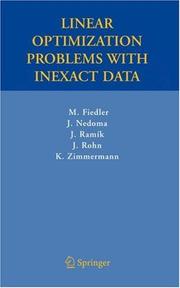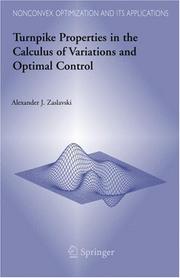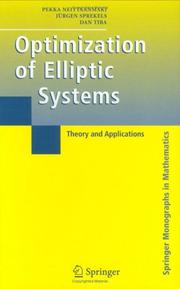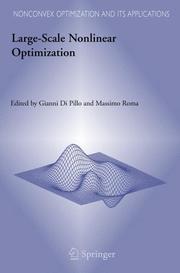| Listing 1 - 10 of 70 | << page >> |
Sort by
|

ISBN: 1280624019 9786610624010 0387326987 0387326979 Year: 2006 Publisher: New York : Springer,
Abstract | Keywords | Export | Availability | Bookmark
 Loading...
Loading...Choose an application
- Reference Manager
- EndNote
- RefWorks (Direct export to RefWorks)
Linear programming attracted the interest of mathematicians during and after World War II when the first computers were constructed and methods for solving large linear programming problems were sought in connection with specific practical problems—for example, providing logistical support for the U.S. Armed Forces or modeling national economies. Early attempts to apply linear programming methods to solve practical problems failed to satisfy expectations. There were various reasons for the failure. One of them, which is the central topic of this book, was the inexactness of the data used to create the models. This phenomenon, inherent in most practical problems, has been dealt with in several ways. At first, linear programming models used "average” values of inherently vague coefficients, but the optimal solutions of these models were not always optimal for the original problem itself. Later researchers developed the stochastic linear programming approach, but this too has its limitations. Recently, interest has been given to linear programming problems with data given as intervals, convex sets and/or fuzzy sets. The individual results of these studies have been promising, but the literature has not presented a unified theory. Linear Optimization Problems with Inexact Data attempts to present a comprehensive treatment of linear optimization with inexact data, summarizing existing results and presenting new ones within a unifying framework. Audience This book is intended for postgraduate or graduate students in the areas of operations research, optimization theory, linear algebra, interval analysis, reliable computing, and fuzzy sets. The book will also be useful for researchers in these respective areas.
Linear programming. --- Mathematical optimization. --- Optimization (Mathematics) --- Optimization techniques --- Optimization theory --- Systems optimization --- Mathematical analysis --- Maxima and minima --- Operations research --- Simulation methods --- System analysis --- Production scheduling --- Programming (Mathematics)

ISBN: 1280412704 9786610412709 0387281541 038728155X 1441939245 Year: 2006 Publisher: New York : Springer,
Abstract | Keywords | Export | Availability | Bookmark
 Loading...
Loading...Choose an application
- Reference Manager
- EndNote
- RefWorks (Direct export to RefWorks)
This book is devoted to the recent progress on the turnpike theory. The turnpike property was discovered by Paul A. Samuelson, who applied it to problems in mathematical economics in 1949. These properties were studied for optimal trajectories of models of economic dynamics determined by convex processes. In this monograph the author, a leading expert in modern turnpike theory, presents a number of results concerning the turnpike properties in the calculus of variations and optimal control which were obtained in the last ten years. These results show that the turnpike properties form a general phenomenon which holds for various classes of variational problems and optimal control problems. The book should help to correct the misapprehension that turnpike properties are only special features of some narrow classes of convex problems of mathematical economics. Audience This book is intended for mathematicians interested in optimal control, calculus of variations, game theory and mathematical economics.
Calculus of variations. --- Mathematical optimization. --- Optimization (Mathematics) --- Optimization techniques --- Optimization theory --- Systems optimization --- Mathematical analysis --- Maxima and minima --- Operations research --- Simulation methods --- System analysis --- Isoperimetrical problems --- Variations, Calculus of --- Calculus of Variations and Optimal Control; Optimization. --- Optimization.

ISBN: 1280743743 9786610743742 0387272364 0387272356 1441920935 Year: 2006 Publisher: New York : Springer,
Abstract | Keywords | Export | Availability | Bookmark
 Loading...
Loading...Choose an application
- Reference Manager
- EndNote
- RefWorks (Direct export to RefWorks)
This monograph provides a comprehensive and accessible introduction to the optimization of elliptic systems. This area of mathematical research, which has many important application in science and technology, has experienced an impressive development during the last two decades. This monograph aims to address some of the pressing unsolved questions in the field. The exposition concentrates along two main directions: the optimal control of linear and nonlinear elliptic equations, and problems involving unknown and/or variable domains. Throughout this monograph, the authors elucidate connections between seemingly different types of problems. One basic feature is to relax the needed regularity assumptions as much as possible in order to include larger classes of possible applications. The book is organized into six chapters that give a gradual and accessible presentation of the material, and a special effort is made to present numerous examples. This monograph is addressed primarily to mathematics graduate students and researchers, however much of this material will also prove useful for scientists from physics, mechanics, and engineering.
Mathematics. --- Partial differential equations. --- Applied mathematics. --- Engineering mathematics. --- Mathematical optimization. --- Optimization. --- Partial Differential Equations. --- Applications of Mathematics. --- Optimization (Mathematics) --- Optimization techniques --- Optimization theory --- Systems optimization --- Mathematical analysis --- Maxima and minima --- Operations research --- Simulation methods --- System analysis --- Engineering --- Engineering analysis --- Partial differential equations --- Math --- Science --- Mathematics --- Differential equations, Elliptic --- Differential equations, Linear. --- Numerical solutions. --- Linear differential equations --- Linear systems --- Differential equations, partial.

ISBN: 1280609354 9786610609352 0387286543 0387282637 1461498341 Year: 2006 Publisher: New York : Springer,
Abstract | Keywords | Export | Availability | Bookmark
 Loading...
Loading...Choose an application
- Reference Manager
- EndNote
- RefWorks (Direct export to RefWorks)
Robust design—that is, managing design uncertainties such as model uncertainty or parametric uncertainty—is the often unpleasant issue crucial in much multidisciplinary optimal design work. Recently, there has been enormous practical interest in strategies for applying optimization tools to the development of robust solutions and designs in several areas, including aerodynamics, the integration of sensing (e.g., laser radars, vision-based systems, and millimeter-wave radars) and control, cooperative control with poorly modeled uncertainty, cascading failures in military and civilian applications, multi-mode seekers/sensor fusion, and data association problems and tracking systems. The contributions to this book explore these different strategies. The expression "optimization-directed” in this book’s title is meant to suggest that the focus is not agonizing over whether optimization strategies identify a true global optimum, but rather whether these strategies make significant design improvements. Audience .
System theory. --- Mathematical optimization. --- Programming (Mathematics) --- Optimization (Mathematics) --- Optimization techniques --- Optimization theory --- Systems optimization --- Mathematical analysis --- Maxima and minima --- Operations research --- Simulation methods --- System analysis --- Systems, Theory of --- Systems science --- Science --- Philosophy --- Mathematical programming --- Goal programming --- Algorithms --- Functional equations --- Mathematical optimization --- Mathematics. --- Systems theory. --- Optimization. --- Applications of Mathematics. --- Systems Theory, Control. --- Math --- Applied mathematics. --- Engineering mathematics. --- Engineering --- Engineering analysis --- Mathematics

ISBN: 1280609435 9786610609437 0387300651 0387300635 1441940146 Year: 2006 Publisher: New York, N.Y. : Springer,
Abstract | Keywords | Export | Availability | Bookmark
 Loading...
Loading...Choose an application
- Reference Manager
- EndNote
- RefWorks (Direct export to RefWorks)
Large-Scale Nonlinear Optimization reviews and discusses recent advances in the development of methods and algorithms for nonlinear optimization and its applications, focusing on the large-dimensional case, the current forefront of much research. The chapters of the book, authored by some of the most active and well-known researchers in nonlinear optimization, give an updated overview of the field from different and complementary standpoints, including theoretical analysis, algorithmic development, implementation issues and applications. Audience This book is intended for researchers in applied mathematics, advanced engineering, and computer science; it is also recommended for further reading within graduate studies, postgraduate and doctoral programs.
Nonlinear theories --- Mathematical optimization --- Mathematical optimization. --- Optimization. --- Science, Humanities and Social Sciences, multidisciplinary. --- Operations Research, Management Science. --- Optimization (Mathematics) --- Optimization techniques --- Optimization theory --- Systems optimization --- Mathematical analysis --- Maxima and minima --- Operations research --- Simulation methods --- System analysis --- Operations research. --- Management science. --- Quantitative business analysis --- Management --- Problem solving --- Statistical decision --- Operational analysis --- Operational research --- Industrial engineering --- Management science --- Research --- System theory
Book
ISSN: 09375511 ISBN: 3540292977 Year: 2006 Volume: 21 Publisher: Berlin, Heidelberg : Springer Berlin Heidelberg : Imprint: Springer,
Abstract | Keywords | Export | Availability | Bookmark
 Loading...
Loading...Choose an application
- Reference Manager
- EndNote
- RefWorks (Direct export to RefWorks)
This comprehensive textbook on combinatorial optimization puts special emphasis on theoretical results and algorithms with provably good performance, in contrast to heuristics. It has arisen as the basis of several courses on combinatorial optimization and more special topics at graduate level. Since the complete book contains enough material for at least four semesters (4 hours a week), one usually selects material in a suitable way. The book contains complete but concise proofs, also for many deep results, some of which did not appear in a book before. Many very recent topics are covered as well, and many references are provided. Thus this book represents the state of the art of combinatorial optimization. This third edition contains a new chapter on facility location problems, an area which has been extremely active in the past few years. Furthermore there are several new sections and further material on various topics. New exercises and updates in the bibliography were added. From the reviews of the 2nd edition: "This book on combinatorial optimization is a beautiful example of the ideal textbook." Operations Research Letters 33 (2005), p.216-217 "The second edition (with corrections and many updates) of this very recommendable book documents the relevant knowledge on combinatorial optimization and records those problems and algorithms that define this discipline today. To read this is very stimulating for all the researchers, practitioners, and students interested in combinatorial optimization." OR News 19 (2003), p.42 .
Combinatorial optimization. --- Mathematics. --- Computer science --- Calculus of variations. --- Combinatorics. --- Calculus of Variations and Optimal Control; Optimization. --- Mathematics of Computing. --- Optimization, Combinatorial --- Combinatorial analysis --- Mathematical optimization --- Mathematical optimization. --- Computer science. --- Informatics --- Science --- Optimization (Mathematics) --- Optimization techniques --- Optimization theory --- Systems optimization --- Mathematical analysis --- Maxima and minima --- Operations research --- Simulation methods --- System analysis --- Combinatorics --- Algebra --- Computer science—Mathematics. --- Isoperimetrical problems --- Variations, Calculus of --- Combinatorial analysis.

ISBN: 1280346868 9786610346868 354029936X 3540276939 Year: 2006 Publisher: Berlin ; New York : Springer,
Abstract | Keywords | Export | Availability | Bookmark
 Loading...
Loading...Choose an application
- Reference Manager
- EndNote
- RefWorks (Direct export to RefWorks)
Network problems are manifold and extremely complex. Many problems result from engineering details or mathematical difficulties, others are caused by disregarding economic principles and imperfections of markets. The text provides a fairly integrated approach of transportation related "network problems" and their "solutions" with emphasis on economics or, more precisely, microeconomic theory.
Transportation --- Network analysis (Planning) --- Planning --- Mathematical models. --- Project networks --- Microeconomics. --- Mathematical optimization. --- Optimization. --- Price theory --- Economics --- Optimization (Mathematics) --- Optimization techniques --- Optimization theory --- Systems optimization --- Mathematical analysis --- Maxima and minima --- Operations research --- Simulation methods --- System analysis --- AA / International- internationaal --- 303.8 --- 385.0 --- Econometrische behandeling van een onderwerp. --- Vervoerwezen, verkeerswegen en -middelen: algemeenheden. --- Econometrische behandeling van een onderwerp --- Vervoerwezen, verkeerswegen en -middelen: algemeenheden
Periodical
Abstract | Keywords | Export | Availability | Bookmark
 Loading...
Loading...Choose an application
- Reference Manager
- EndNote
- RefWorks (Direct export to RefWorks)
Mathematical optimization --- Combinatorial optimization --- Optimisation mathématique --- Optimisation combinatoire --- Optimaliseren. --- Optimization, Combinatorial --- Combinatorial optimization. --- Mathematical optimization. --- Combinatorial analysis --- Optimization (Mathematics) --- Optimization techniques --- Optimization theory --- Systems optimization --- Mathematical analysis --- Maxima and minima --- Operations research --- Simulation methods --- System analysis --- Mathematical Sciences --- Applied Mathematics --- Optimizaton. --- Operations Research --- Optimització matemàtica --- Optimització combinatòria --- Optimisation mathématique --- Optimització matemàtica. --- Optimització combinatòria.
Book
ISBN: 1281919365 9786611919368 9812774246 9789812774248 9781281919366 Year: 2006 Publisher: Hackensack, NJ : World Scientific,
Abstract | Keywords | Export | Availability | Bookmark
 Loading...
Loading...Choose an application
- Reference Manager
- EndNote
- RefWorks (Direct export to RefWorks)
This important book reviews applications of optimization and optimal control theory to modern problems in physics, nano-science and finance. The theory presented here can be efficiently applied to various problems, such as the determination of the optimal shape of a laser pulse to induce certain excitations in quantum systems, the optimal design of nanostructured materials and devices, or the control of chaotic systems and minimization of the forecast error for a given forecasting model (for example, artificial neural networks). Starting from a brief review of the history of variational calcul
Chaotic behavior in systems. --- Control theory. --- Differentiable dynamical systems. --- Mathematical optimization. --- Optimization (Mathematics) --- Optimization techniques --- Optimization theory --- Systems optimization --- Mathematical analysis --- Maxima and minima --- Operations research --- Simulation methods --- System analysis --- Differential dynamical systems --- Dynamical systems, Differentiable --- Dynamics, Differentiable --- Differential equations --- Global analysis (Mathematics) --- Topological dynamics --- Dynamics --- Machine theory --- Chaos in systems --- Chaos theory --- Chaotic motion in systems --- Differentiable dynamical systems --- Nonlinear theories --- System theory
Book
ISBN: 1280613491 9786610613496 0387249761 Year: 2006 Volume: 1 Publisher: New York : Springer,
Abstract | Keywords | Export | Availability | Bookmark
 Loading...
Loading...Choose an application
- Reference Manager
- EndNote
- RefWorks (Direct export to RefWorks)
This book, a result of the authors’ teaching and research experience in various universities and institutes over the past ten years, can be used as a textbook for an optimization course for graduates and senior undergraduates. It systematically describes optimization theory and several powerful methods, including recent results. For most methods, the authors discuss an idea’s motivation, study the derivation, establish the global and local convergence, describe algorithmic steps, and discuss the numerical performance. The book deals with both theory and algorithms of optimization concurrently. It also contains an extensive bibliography with 366 references. Finally, apart from its use for teaching, Optimization Theory and Methods is also very beneficial for doing research. Audience This book is intended for senior students, graduates, teachers, and researchers in optimization, operations research, computational mathematics, applied mathematics, and some engineering and economics. It will also be useful for scientists in engineering and economics.
Nonlinear programming. --- Mathematical optimization. --- Optimization (Mathematics) --- Optimization techniques --- Optimization theory --- Systems optimization --- Mathematical analysis --- Maxima and minima --- Operations research --- Simulation methods --- System analysis --- Programming (Mathematics) --- Numerical analysis. --- Computer science. --- Optimization. --- Numerical Analysis. --- Operations Research, Management Science. --- Computational Science and Engineering. --- Informatics --- Science --- Operations research. --- Management science. --- Computer mathematics. --- Computer mathematics --- Electronic data processing --- Mathematics --- Quantitative business analysis --- Management --- Problem solving --- Statistical decision --- Operational analysis --- Operational research --- Industrial engineering --- Management science --- Research --- System theory
| Listing 1 - 10 of 70 | << page >> |
Sort by
|

 Search
Search Feedback
Feedback About UniCat
About UniCat  Help
Help News
News